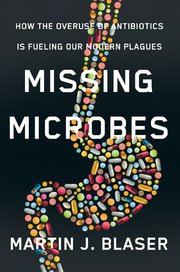 Excerpts from a very interesting NPR interview with Dr. Martin Blaser and his views on the human microbiome. The big take-away: our modern life-style is not good for the gut microbiome. His recently published book is Missing Microbes: How the Overuse of Antibiotics is Fueling Our Modern Plagues.
Excerpts from a very interesting NPR interview with Dr. Martin Blaser and his views on the human microbiome. The big take-away: our modern life-style is not good for the gut microbiome. His recently published book is Missing Microbes: How the Overuse of Antibiotics is Fueling Our Modern Plagues.
From NPR News: Modern Medicine May Not Be Doing Your Microbiome Any Favors
There are lots of theories about why food allergies, asthma, celiac disease and intestinal disorders like Crohn's disease have been on the rise. Dr. Martin Blaser speculates that it may be connected to the overuse of antibiotics, which has resulted in killing off strains of bacteria that typically live in the gut.
Blaser is an expert on the human microbiome, which is the collection of bacteria, viruses, fungi and other microbes that live in and on the body. In fact, up to 90 percent of all the cells in the human body aren't human at all — they're micro-organisms. Blaser is the director of NYU's Human Microbiome Program and a former chairman of medicine there. His new book is called Missing Microbes: How the Overuse of Antibiotics Is Fueling Our Modern Plagues.
"Since World War II, we've seen big rises in a number of diseases: asthma, allergies, food allergies, wheat allergy, juvenile diabetes, obesity. ... These are all diseases that have gone up dramatically in the last 50 or 70 years. One of the questions is: Why are they going up? Are they going up for 10 different reasons, or perhaps there is one reason that is fueling all of them."
"My theory is that the one reason is the changing microbiome; that we evolved a certain stable situation with our microbiome and with the modern advances of modern life, including modern medical practices, we have been disrupting the microbiome. And there's evidence for that, especially early in life, and it's changing how our children develop."
"There's a choreography; there's a normal developmental cycle of the microbiome from birth over the first few years of life, especially the first three years, [that] appear[s] to be the most important. And that's how nature has, how we have, evolved together so that we can maximize health and create a new generation, which is nature's great purpose. And because of modern practices, we have disrupted that. And then the question is: Does that have consequence[s]?"
"As far as we know, when the baby is inside the womb it is apparently sterile. ... The big moment of truth is when the membranes rupture, the water breaks, and the baby starts coming out. And that's where they first get exposed to the bacteria of the world, and the first bacteria they're exposed to is their mother's bacteria in the birth canal. So as labor proceeds, the babies are in contact with the microbes lining their mother's vagina and, as they're going out, they're covered by these bacteria. They swallow the bacteria; it's on their skin. ..."
"That's their initial exposure to the world of bacteria. That's how mammals have been doing it for the last 150 million years, whether they're dolphins or elephants or humans. ... And we know a little about what those bacteria are. The most common bacteria are lactobacillus and there's evidence that over the course of pregnancy the microbiome in the vagina changes, just as many other parts of the body are changing. The microbiome is changing in its composition in terms of maximizing lactobacilli, and these are bacteria that eat lactose, which is the main component of milk. So the baby's mouth is filled with lactobacilli. The first thing that happens is they go up against their mom's breast and they inoculate the nipple with lactobacilli and now milk and lactobacilli go into the new baby and that's the foundation for their microbiome and that's how they start their life. ..."
"You could project that if they didn't acquire these organisms or they didn't acquire them normally or at the normal time, then the foundations might be a little shaky."
"Shortly after birth, they compared the microbiomes in the babies that came out. The babies that were born vaginally, their microbiome, not surprisingly, looked like the mom's vagina everywhere in the body — in their GI tract, on their skin, in their mouth. But the babies born by C-section, their microbiome looked like skin and it didn't even necessarily look like the mom's skin, maybe it was somebody else in the operating room. So it's clear that the microbiome is different immediately depending on the kind of birth."
"What I can tell you is that our immune system is quite complex. There are many kinds of immune cells. There are cells that strongly recognize foreign substances, there are ones that try to damp [the immune system] and down-regulate it. There's what we call innate immunity, which is the immunity we're all born with, and then there's adaptive immunity — the immunity that develops when we experience different kinds of exposures. So it's very complex."
"There are many different probiotics. I think I can say three things: The first is that they're almost completely unregulated; second is that they seem to be generally safe; and third is that they're mostly untested. ... I'm actually a big believer in probiotics; I think that's going to be part of the future of medicine, that we're going to understand the science of the microbiome well enough so that we can look at a sample from a child and say this child is lacking such-and-such an organism and now we're going to take it off the shelf and we're going to give it back to that child. ... "
